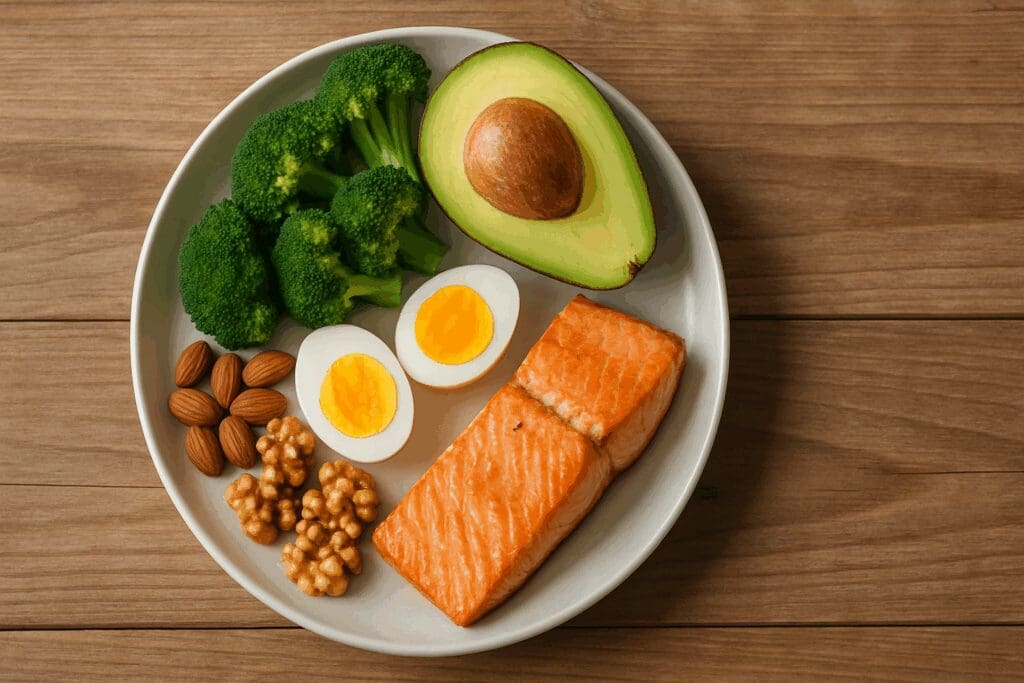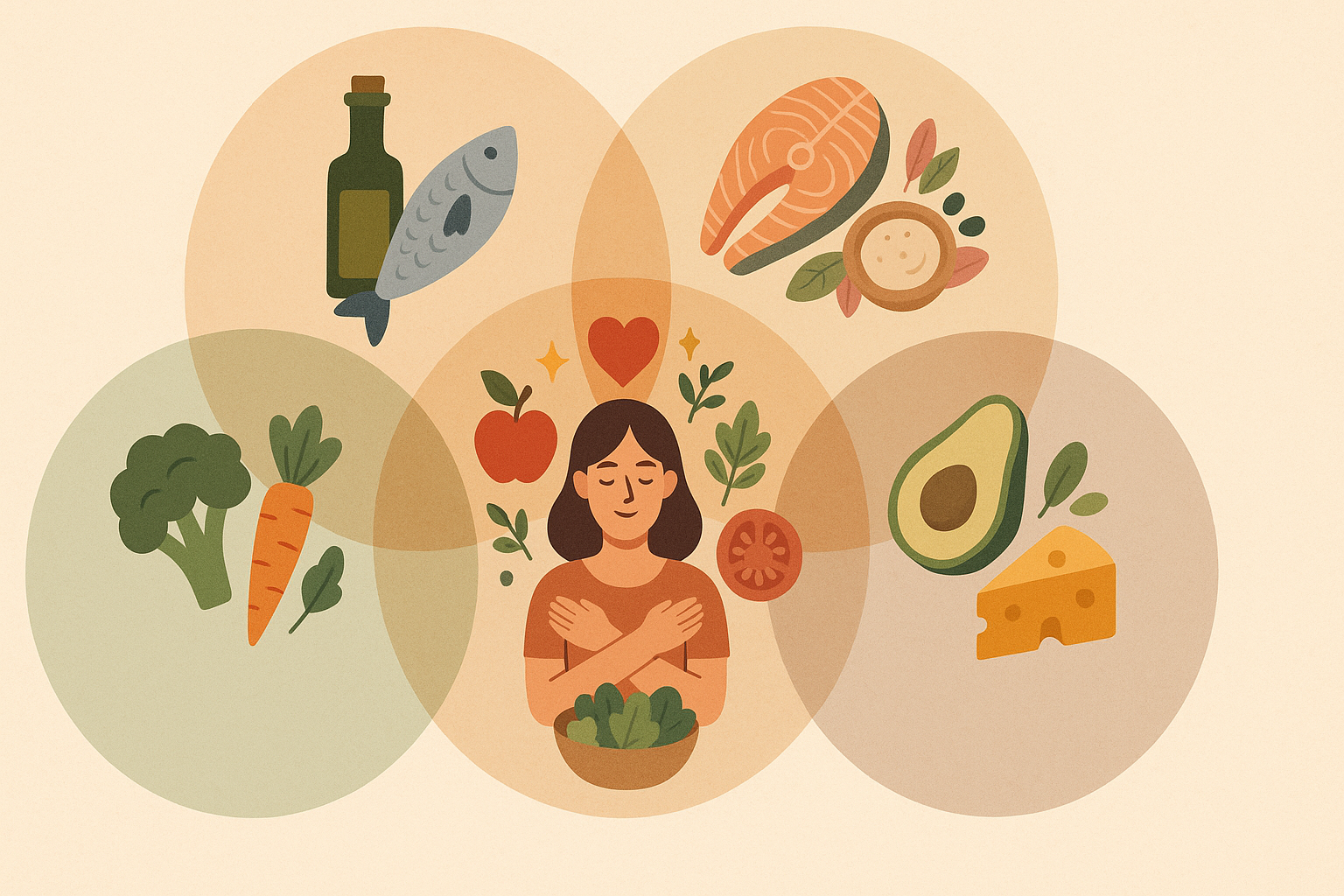Navigating the world of nutrition can be overwhelming, especially for women whose physiological and hormonal needs shift dramatically throughout life. From adolescence to menopause and beyond, understanding how to eat for energy, hormonal balance, and long-term vitality is crucial. Embracing the top diets for women offers a structured yet flexible approach to meeting these evolving needs, aligning science-backed principles with everyday practicality. Whether the goal is improved mood, weight stability, reproductive support, or chronic disease prevention, diet plays a pivotal role. This comprehensive guide explores nutritional frameworks that deliver real results—diets that really work for women—while avoiding fads and embracing sustainability, enjoyment, and nourishment.
You may also like: 10 Essential Tips on Choosing Healthy Food for Ladies to Boost Energy and Wellness

Understanding Women’s Unique Nutritional Needs Across the Lifespan
The female body experiences more biological milestones than its male counterpart, including menarche, pregnancy, postpartum recovery, perimenopause, and menopause. Each of these stages comes with unique hormonal fluctuations that directly impact metabolism, nutrient requirements, and appetite. For example, menstruating women often need more iron due to monthly blood loss, while pregnant individuals require higher levels of folate, choline, and calcium to support fetal development. During menopause, lower estrogen levels can impact bone density and heart health, shifting dietary priorities once again.
A crucial consideration when reviewing the top diets for women is understanding these shifting needs. A diet plan that works for a twenty-year-old athlete may be ineffective—or even harmful—for a fifty-five-year-old woman managing hormonal imbalances. As such, personalized and adaptive strategies are essential. Macronutrient balance, fiber intake, and micronutrient density become the foundation, with specific modifications tailored to life stage and health status. Effective diets that really work must account for these variables, avoiding a cookie-cutter approach in favor of customization and responsiveness.
Beyond biology, lifestyle plays a major role. Women balancing careers, caregiving, and personal development often experience higher levels of stress, less time for meal planning, and inconsistent eating schedules. These challenges must be addressed when building dietary strategies, ensuring that the top diets for women are not only nutritionally sound but also realistic, accessible, and emotionally supportive.
Characteristics of Diets That Really Work for Women
Before diving into specific diet frameworks, it’s important to define what makes a diet truly effective for women. The most successful dietary approaches aren’t built on deprivation or rigid rules but instead emphasize sustainability, flexibility, and nutrient richness. Diets that really work for women often include whole foods, ample fiber, healthy fats, and a wide array of colorful fruits and vegetables. These components fuel energy, regulate hormones, support digestion, and minimize inflammation.
Satiety and blood sugar stability are also key elements. Diets that include balanced meals with protein, fat, and complex carbohydrates prevent energy crashes and reduce cravings. This is especially important for women experiencing insulin resistance, PCOS, or perimenopausal blood sugar fluctuations. Furthermore, a high fiber intake helps manage cholesterol levels, promote digestive health, and improve satiety—all critical for weight maintenance and metabolic health.
Psychological support is another factor that distinguishes top diets for women. Approaches that encourage food freedom, mindfulness, and intuitive eating foster long-term adherence and reduce the risk of disordered eating. Sustainable weight loss and health improvements are more likely when women feel empowered, rather than restricted. The most successful diets don’t impose arbitrary rules—they equip women with tools to make confident, informed choices in any context.

Mediterranean-Inspired Eating: A Gold Standard Among Top Diets for Women
Among all eating patterns evaluated for long-term health and sustainability, the Mediterranean diet remains one of the most researched and recommended. Rooted in the culinary traditions of countries like Greece, Italy, and Spain, this diet emphasizes plant-based foods, healthy fats, moderate wine consumption, and minimal processed ingredients. What makes it stand out among the top diets for women is its versatility and ability to support cardiovascular health, cognitive function, and hormonal balance.
The Mediterranean approach features abundant vegetables, fruits, legumes, whole grains, nuts, seeds, and extra virgin olive oil as dietary staples. Fish and seafood are encouraged several times per week, while red meat is consumed sparingly. This dietary pattern offers anti-inflammatory benefits and supplies ample antioxidants, omega-3 fatty acids, fiber, and polyphenols—all essential for disease prevention and vitality.
Particularly for midlife women, the Mediterranean diet is protective against osteoporosis, hypertension, and cognitive decline. Its generous intake of calcium-rich greens, magnesium-containing legumes, and heart-healthy fats supports hormonal transitions while minimizing risk factors for chronic illness. Moreover, it aligns with cultural and social aspects of food, encouraging shared meals and mindful eating, which can enhance psychological well-being.
What makes it one of the diets that really work for women is its adaptability. Whether a woman is gluten-free, vegetarian, or navigating a busy schedule, the Mediterranean model can be adjusted without losing its core principles. For those seeking an eating style that emphasizes nourishment, longevity, and balance, this diet serves as a compelling foundation.

Hormone-Focused Nutrition: Targeting Balance and Symptom Relief
Hormonal fluctuations can significantly impact women’s daily lives, influencing everything from mood and energy to skin health and weight. For women navigating conditions like polycystic ovary syndrome (PCOS), endometriosis, or perimenopausal transitions, adopting hormone-supportive dietary strategies becomes essential. Some of the top diets for women in these categories integrate anti-inflammatory foods, strategic macronutrient balance, and blood sugar regulation as core principles for symptom management and hormonal equilibrium.
One of the central themes of hormone-focused diets is the avoidance of highly processed foods that disrupt endocrine signaling and promote systemic inflammation. Refined sugars, seed oils, and artificial additives can contribute to insulin resistance and exacerbate estrogen dominance, both common drivers of hormonal imbalance. In contrast, whole foods like cruciferous vegetables (broccoli, cauliflower, kale), flaxseeds, berries, and wild-caught fatty fish offer fiber, antioxidants, and essential fatty acids that enhance detoxification, modulate estrogen, and stabilize insulin.
Protein timing and carb control also play a pivotal role. Diets that really work for women with hormonal issues often include protein-rich breakfasts to support cortisol regulation and reduce mid-morning energy crashes. Strategic carbohydrate intake—focused on fiber-rich sources like legumes, oats, and sweet potatoes—ensures that insulin response remains moderated without triggering hormonal chaos. For women with PCOS, this is especially beneficial, as insulin sensitivity is key to restoring ovulation and reducing androgen excess.
Supplements can enhance hormonal support when used appropriately under clinical guidance. Magnesium, B vitamins, and omega-3s are frequently recommended in hormone-balancing plans. However, no supplement can replace a strong dietary foundation. The top diets for women with hormonal needs integrate nutrient synergy, inflammation control, and blood sugar stability as essential pillars, empowering women to feel grounded, energized, and hormonally harmonious.

Plant-Based Approaches: Ethical, Sustainable, and Tailored to Women’s Health
Plant-based diets have gained significant attention not only for their ethical and environmental benefits but also for their potential to improve women’s health outcomes. Diets focused on whole plant foods—such as the vegetarian or vegan diet—can be among the top diets for women when properly planned. They offer protection against chronic diseases, improve digestion, and reduce hormonal disturbances linked to high saturated fat intake from animal products.
Women who adopt plant-based diets often report improvements in menstrual regularity, reduced premenstrual symptoms, and better skin health. This is largely due to the high intake of fiber and phytoestrogens, which support estrogen metabolism and reduce inflammation. Foods like lentils, tofu, flaxseeds, and leafy greens not only provide essential nutrients but also contribute to hormonal balance and digestive regularity.
However, plant-based diets must be approached with mindfulness to avoid nutrient deficiencies. Key nutrients of concern include iron, zinc, vitamin B12, and omega-3 fatty acids. Ensuring adequate intake through fortified foods or supplementation is necessary for long-term success. Additionally, protein variety is important, combining legumes, grains, nuts, and seeds to achieve a full amino acid profile.
When carefully constructed, plant-forward diets that really work for women can be highly satisfying and health-promoting. They can also be adapted to include flexitarian approaches, where occasional inclusion of fish, dairy, or eggs can help meet nutrient needs while retaining the primary benefits of plant emphasis. For women seeking a diet that aligns with ethical values and supports hormonal, cardiovascular, and digestive health, plant-based strategies offer a powerful and flexible option.

Ketogenic and Low-Carb Diets: Strategic Use for Weight and Energy Management
The ketogenic diet, once reserved for epilepsy treatment, has become a mainstream approach for weight loss and metabolic health. While often associated with extreme carb restriction, the keto diet can be one of the top diets for women when modified for safety, hormonal health, and sustainability. Women with insulin resistance, prediabetes, or PCOS may benefit from this approach, as reducing carbohydrate intake can improve glucose control and facilitate fat loss.
The key to making ketogenic diets work for women lies in personalization and nutrient quality. A clean, whole-food-based keto plan—featuring non-starchy vegetables, high-quality fats, moderate protein, and limited processed meats—can improve energy levels and reduce inflammation. For active women or those in reproductive years, cycling in carbohydrates or following a modified low-carb approach may be more hormonally supportive.
There are important considerations, however. Extremely low-carb diets may interfere with thyroid function or menstrual regularity if not appropriately balanced. Women prone to adrenal fatigue or high stress levels may not thrive on strict ketosis, especially without proper support. Therefore, any low-carb or ketogenic diet should be approached with a focus on nutrient density, adequate sleep, and stress management.
Diets that really work for women in this category often allow for flexibility—such as cyclical keto or carb refeeding days—to ensure hormonal integrity. When combined with strength training, these approaches can improve body composition, reduce cravings, and support steady energy. For women seeking to break through plateaus or manage stubborn weight gain, particularly in the abdominal region, well-constructed low-carb strategies can be an effective tool.
Intermittent Fasting: Time-Restricted Eating Tailored for Female Physiology
Intermittent fasting (IF) has surged in popularity for its potential to improve metabolic health, reduce inflammation, and enhance cellular repair. However, its application for women must be handled with nuance. What may work for men or postmenopausal women might not yield the same benefits—or could even be detrimental—for women in their reproductive years if not practiced with caution. That said, intermittent fasting remains one of the top diets for women when tailored to their biological rhythm and hormonal feedback loops.
Women are more sensitive to energy availability due to their reproductive biology. Aggressive fasting protocols, such as the 16:8 method or alternate-day fasting, may disrupt menstrual cycles, thyroid function, or cortisol regulation in some. As such, shorter fasting windows—such as 12:12 or 14:10—often produce better outcomes. These regimens can enhance insulin sensitivity, promote weight stability, and reduce nighttime eating without overly stressing the endocrine system.
When practiced mindfully, time-restricted eating helps women tune into hunger cues, reduce emotional eating, and align eating patterns with circadian rhythms. Eating within daylight hours, for example, has been shown to support digestion and hormonal balance more effectively than late-night meals. Additionally, IF can be paired with other diets that really work for women, such as Mediterranean or plant-based approaches, to enhance metabolic resilience.
Fasting should never be used as a form of punishment or deprivation. It must be accompanied by nutrient-rich meals during feeding windows and adequate hydration throughout. Women should also monitor their sleep, mood, cycle, and energy levels while fasting to determine if the protocol supports their well-being. When individualized and well-supported, intermittent fasting can offer significant benefits for women’s health.

The Role of Intuitive Eating in Women’s Long-Term Well-Being
While structured diet plans can offer guidance, intuitive eating represents a paradigm shift that centers trust in the body’s innate wisdom. It rejects external food rules and instead fosters a relationship with food based on internal cues of hunger, fullness, and satisfaction. For many women, particularly those with a history of chronic dieting, intuitive eating emerges as one of the top diets for women—because it isn’t a diet at all, but a holistic framework for healing.
Intuitive eating promotes psychological flexibility and self-compassion. It encourages women to make food choices based on how they feel rather than how they look or what the scale says. This approach has been associated with lower rates of disordered eating, improved self-esteem, and more stable weight over time. It empowers women to honor cravings without guilt and to prioritize nourishment without rigidity.
Importantly, intuitive eating doesn’t mean eating whatever, whenever, with no regard for health. It emphasizes attunement to the body’s needs, which often naturally guides women toward whole foods, balanced meals, and regular movement. It also helps dismantle the shame-based narrative surrounding food that many women internalize from diet culture.
Diets that really work for women over the long term tend to include elements of intuitive eating—such as mindfulness, flexibility, and personalization. Even women who follow structured eating patterns can benefit from incorporating intuitive eating principles. Whether navigating cravings during menstruation or adapting to changing appetites during menopause, intuition-based eating provides the adaptability needed to thrive.
Top Diets for Women Seeking Energy and Mood Stability
A recurring theme in women’s health is the interplay between nutrition, mood, and energy. Blood sugar instability, micronutrient deficiencies, and inflammatory foods can all contribute to mood swings, anxiety, and fatigue. Diets that prioritize steady energy and emotional well-being stand out among the top diets for women because they address these root causes holistically.
The foundation of such diets includes complex carbohydrates, lean proteins, and healthy fats at every meal. These macronutrients support neurotransmitter synthesis, regulate blood sugar, and fuel mental focus. Foods rich in omega-3 fatty acids—like walnuts, flaxseeds, and sardines—support cognitive health and reduce symptoms of depression. Meanwhile, B vitamins and magnesium play vital roles in managing stress response and reducing irritability.
One often-overlooked contributor to low energy and poor mood is iron deficiency, especially in menstruating women. Ensuring adequate intake of iron-rich foods, such as red meat, legumes, and leafy greens, can significantly boost vitality. Similarly, sufficient hydration, regular meals, and limiting caffeine and sugar intake all contribute to sustained energy levels and more stable mood patterns.
Diets that really work for women who struggle with energy crashes or low mood are those that nourish rather than deplete. They help regulate the stress response, support sleep, and reduce inflammation. A personalized dietary approach that includes mood-stabilizing nutrients and balanced macronutrients becomes not only a health strategy but a form of self-care.

Combining the Best Elements of Top Diets for Women
Rather than adhering rigidly to one diet, many women thrive by combining principles from several top diets for women into a cohesive, personalized strategy. This hybrid approach allows for flexibility while preserving the benefits of each system. For instance, a woman might eat primarily plant-based, integrate intermittent fasting a few days a week, and follow Mediterranean principles for balance and anti-inflammatory support.
Customization is key. The most sustainable diets are those that align with personal values, preferences, and life demands. A mother of three navigating a busy household may benefit from batch cooking and a simplified version of Mediterranean eating. An executive managing high stress might prioritize hormone-balancing meals with strategic fasting. A menopausal woman focused on muscle retention could emphasize protein-dense meals and resistance training alongside her dietary routine.
Diets that really work for women share a few unshakable pillars: nutrient density, personalization, sustainability, and enjoyment. When women are encouraged to listen to their bodies, make empowered choices, and prioritize well-being over aesthetics, they are more likely to develop lifelong habits that support health, energy, and hormonal resilience.
Frequently Asked Questions About the Top Diets for Women and What Really Works
1. What sets the top diets for women apart from general weight loss programs?
The top diets for women consider hormonal changes, reproductive health, and metabolic variability—factors often overlooked in generic plans. Unlike unisex diets, these tailored strategies focus on nutrient timing, micronutrient sufficiency (like iron and calcium), and cycle syncing to optimize energy and mood. Programs designed for women also tend to include psychological components, recognizing the emotional aspects of eating and body image. These diets that really work often include flexible structures, allowing women to maintain their social lives and preferences without guilt. Success hinges on personalization—what works for one woman may not work for another, even if both are using top-tier plans.
2. How can I tell which diets that really work are actually evidence-based?
Diets that really work are usually grounded in scientific research, not marketing gimmicks. Look for plans endorsed by registered dietitians, clinical studies, or health organizations, rather than influencers. A diet’s efficacy can often be evaluated by its ability to promote gradual fat loss, muscle preservation, and sustainable habits. Avoid any “top diets for women” that promise extreme or rapid results—true evidence-based plans emphasize metabolic health over fast numbers on the scale. Always cross-reference diet recommendations with peer-reviewed sources or consult a medical professional for validation.
3. Are there psychological advantages to following top diets for women?
Absolutely—following diets that really work can reduce decision fatigue and foster self-trust. Structured plans give clarity, which can reduce stress around food choices and prevent disordered eating patterns. When a diet is designed with women’s emotional cycles in mind, it can improve mental resilience and body satisfaction. The top diets for women often include journaling, check-ins, and mindfulness techniques that enhance self-awareness. A strong psychological foundation in a dietary plan makes it more than a nutritional guide—it becomes a tool for empowerment.
4. How do social and cultural factors influence the success of top diets for women?
Cultural identity plays a major role in the sustainability of a diet. Diets that really work for women account for traditional food customs, cooking styles, and communal eating practices. For instance, Mediterranean-inspired diets often perform well because they emphasize whole foods without eliminating cultural staples like bread or olive oil. The top diets for women are inclusive, allowing for substitutions and flexibility that respect cultural norms. Without this sensitivity, even nutritionally sound diets may fail due to social friction or emotional disconnect.
5. Can diets that really work adapt to different life stages?
Yes, the most effective diets evolve with a woman’s changing physiological needs. Teenagers require diets rich in protein, iron, and healthy fats to support growth. Women in their reproductive years benefit from hormone-balancing foods, while those in menopause often shift toward plans that support bone health and metabolic stability. The top diets for women don’t treat life as static—they’re structured for transitions, whether it’s pregnancy, postpartum recovery, or perimenopause. Longevity in dieting success comes from this adaptability, not from one-size-fits-all solutions.
6. What role does exercise play in the success of top diets for women?
While nutrition is foundational, integrating a fitness component enhances fat loss, muscle tone, and metabolic flexibility. Diets that really work often recommend pairing food intake with the type and intensity of exercise—strength training requires different macros than endurance workouts. For example, carb cycling may work well for women who lift weights, while moderate fat intake supports hormone production during intense cardio phases. The most respected top diets for women incorporate movement as a complementary pillar, not an afterthought. Together, diet and exercise create a feedback loop of progress and motivation.
7. How can busy women implement top diets without overwhelming their schedules?
Meal prepping, grocery planning, and digital tools make following the top diets for women feasible for even the busiest individuals. Many of the diets that really work emphasize simplicity—repeatable meals, batch cooking, and minimal ingredients. Using mobile apps to track macros or schedule meals can save time while providing a sense of structure. Subscription-based services now offer ready-to-go meals that align with popular women-specific diet plans. The key is automation: making healthy choices the default rather than the exception.
8. Are there common myths about the top diets for women that hinder progress?
Yes, several myths persist. One is that diets for women must always be low in calories or fat to be effective. In reality, extremely low intake can backfire, disrupting hormones and slowing metabolism. Another myth is that carbs are inherently bad—many top diets for women include complex carbs to stabilize mood and support workout recovery. Finally, detoxes and quick-fix cleanses are often mistaken for diets that really work, when in fact they offer no long-term benefits. Discerning fact from fad is crucial for sustained results.
9. How do the best diets that really work support both weight loss and long-term health?
Unlike short-term fixes, diets that really work are designed with longevity in mind. They promote consistent blood sugar levels, healthy cholesterol, and digestive efficiency. Instead of relying on supplements or meal replacements, the top diets for women encourage whole food consumption with an emphasis on fiber, healthy fats, and lean proteins. They also teach behavioral strategies—like mindful eating and portion control—that translate into lifelong habits. When a diet aligns with a woman’s personal values and health needs, its benefits extend far beyond aesthetics.
10. What future trends are shaping the next generation of top diets for women?
The future of diets that really work lies in precision nutrition and personalization. DNA-based diet testing, microbiome analysis, and AI-driven meal planning are emerging tools that will soon redefine the top diets for women. Plant-forward eating, sustainable sourcing, and stress-adaptive plans are also becoming central to new dietary approaches. Expect more crossover between mental health and nutrition, where emotional resilience is considered as important as nutrient balance. As women demand more from their wellness routines, diet plans will increasingly cater to the whole person, not just their calorie count.
Conclusion: Embracing the Top Diets for Women as a Journey, Not a Destination
The landscape of women’s health is nuanced, complex, and deeply individual. There is no single best diet for all women—but rather, a constellation of evidence-based, customizable approaches that can meet the unique needs of each life stage and lifestyle. The top diets for women are those that adapt, support, and sustain—not restrict or punish. They include Mediterranean balance, plant-powered vitality, hormone-focused precision, and the gentle wisdom of intuitive eating.
By focusing on diets that really work—because they prioritize real food, personalization, and emotional well-being—women can reclaim control over their health and embrace eating as a source of joy, energy, and empowerment. Sustainable nutrition is not about perfection; it’s about progress, flexibility, and honoring the body’s evolving needs with compassion and clarity.
As we redefine what healthy eating means in the context of women’s lives, it becomes clear that the most powerful diet is the one that nurtures the whole woman—body, mind, and spirit. And when women are supported to eat in ways that reflect their deepest values and needs, they not only improve their own health but set a powerful example for generations to come.
Further Reading:
The 9 Best Diet Plans for Your Overall Health



